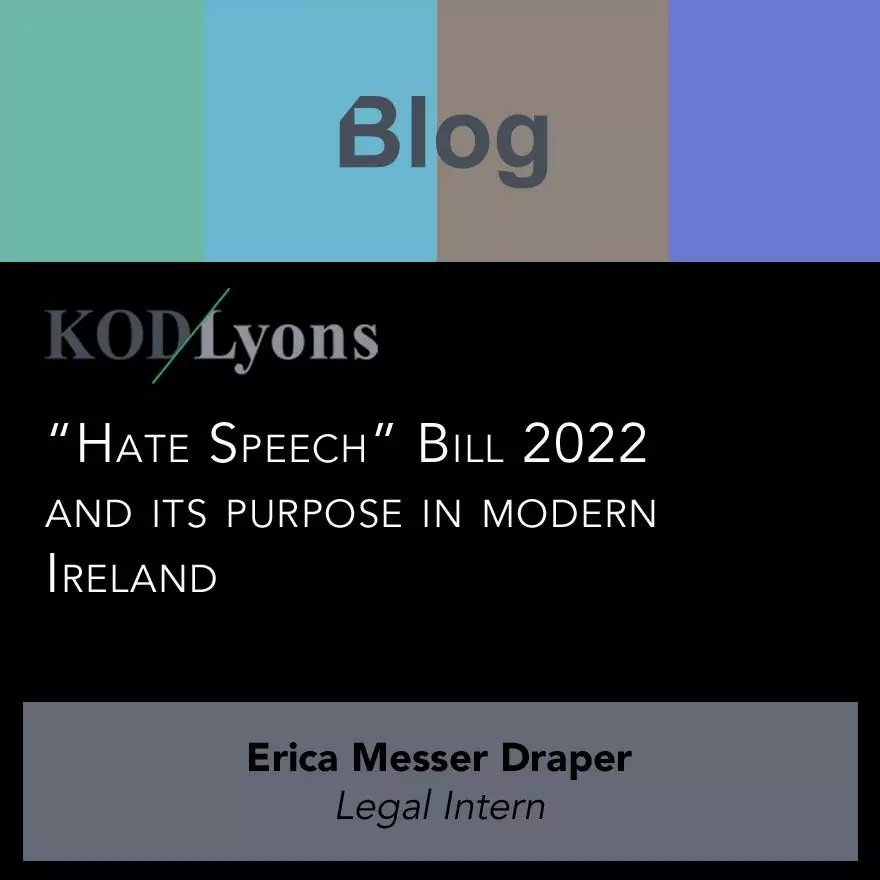The Criminal Justice (Incitement to Violence or Hatred and Hate Offences) Bill 2022 and its purpose in modern Ireland.
As of 21 June 2023, the Criminal Justice (Incitement to Violence or Hatred and Hate Offences) Bill 2022 (“the Bill”) is at Seanad Third Stage. As the likely enactment of this Bill nears, this blog will highlight the need and purpose of this Bill.
On 13 June 2023, Minister Helen McEntee discussed the Bill and highlighted the fact that An Garda Siochana have reported a 29% increase in reported hate crimes in 2022, compared to 2021. This alarming statistic highlights the need for the enactment of this Bill. Minister McEntee went on to acknowledge the ineffectiveness of the current legislation which has been in place for 35 years. The approach to the Bill was set out simply, as being evidence-based, fit for the purpose and a legally prudent approach to legislation for hate-based offences in Ireland – in line with EU and international good practice.
This Bill can be recognised as Ireland giving effect to the Council Framework Decision 2008/913/JHA of 28 November 2008. This Decision set out to combat certain forms and expressions of racism and xenophobia by means of criminal law. It is recognised that racism and xenophobia are direct violations of principles of liberty, democracy, respect for human rights and fundamental freedoms and the rule of law. This Decision further highlights the need for Member State cooperation to ensure effectiveness in combatting racism and xenophobia in the form of implementation of comprehensive and clear legislation. The Bill encompasses the Council Framework Decision and has formulated this in a coherent manner.
In the Bill, ‘hatred’ is defined as meaning hatred against a person or group of persons in the State or elsewhere on account of their protected characteristics or any one of those characteristics (Section 2(1)). The Bill includes a list of what constitutes a ‘protected characteristic’, being race, colour, nationality, religion, nation or ethnic origin, descent, gender, sex characteristics, sexual orientation or disability, (Section 3(1)).
As per the Bill, a person shall be guilty of an offence under Section 7(1)(a) if this person (i) communicates material to the public or a section of the public, or (ii) behaves in a public place in a manner that is likely to incite violence or hatred against a person or group of persons on account of those characteristics or any of those characteristics or being reckless as to whether such violence or hatred is thereby incited. Section 7(1)(b) highlights that the person must have acted with intent to incite violence or hatred against a person or group of persons on account of those characteristics or any of those characteristics or being reckless as to whether such violence or hatred is thereby incited. The Bill further sets out that Body Corporates will be held to the same standard in respect of their communication material and repeals the Prohibition of Incitement to Hatred Act 1989.
As per Section 7(3), defences to this offence require the accused to prove that the material or behaviour concerned consisted solely of a reasonable and genuine contribution to literary, artistic, political, scientific, religious or academic discourse; a statement that is the subject of the defence of absolute privilege, or; material or behaviour that is necessary for any other lawful purpose, including law enforcement or the investigation or the prosecution of an offence.
As highlighted by Section 7(5)(a), a person guilty of an offence shall be liable on summary conviction to a class A fine or imprisonment for a term not exceeding 12 months or both. On conviction on indictment, a person guilty of an offence shall be liable to a fine or imprisonment for a term not exceeding 5 years or both.
The transposition of the EU Framework Decision is crucial in our society to protect those who may find themselves in vulnerable positions due to their protected characteristics. The Hate Crime Online Reporting Statistics 2022 released by An Garda Siochana highlights the breakdown of the hate crimes in 2022, most of these motives being anti-race (198), anti-sexual orientation (135), anti-nationality (130). The Criminal Justice (Incitement to Violence or Hatred and Hate Offences) Bill 2022 is a step forward in effectively combatting the serious issues of hate speech in our society, and will be welcomed with open arms to maintain Ireland’s modern and welcoming reputation.
Get in touch
Leaders in our field and winners at the Irish Law awards we have proven expertise in immigration and international law, child and family law and personal injury litigation.
Tel: +353 1 679 0780
Email: info@kodlyons.ie








